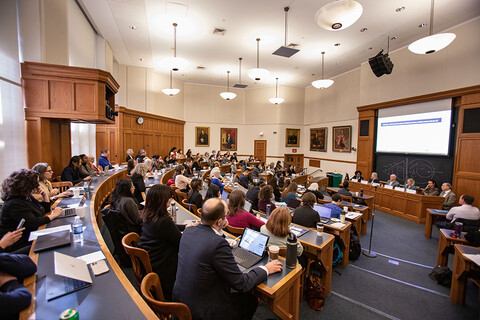2023 Conference, "Medical-Legal Partnerships: Equity, Evaluation & Evolution"

In March 2023, the Solomon Center for Health Law and Policy1 at Yale Law School held a two-day conference, “Medical-Legal Partnerships: Equity, Evaluation and Evolution2.” The event was co-hosted with the Georgetown University Health Justice Alliance3 and Penn State Dickinson Law4 and supported by the Oscar M. Ruebhausen Fund at Yale Law School.
In conjunction with the conference, the host organizations guest edited a special issue5 of The Journal of Law, Medicine, and Ethics (JLME). The volume, a first-of-its kind academic collaboration between lawyers and doctors at Yale and beyond, contains 19 articles exploring cutting-edge questions about structural health inequities, including racial justice, intersectionality, and ethics considerations, as well as policy challenges, such as the establishing the economic benefits of medical-legal partnerships.
Medical-legal partnerships (MLPs) integrate legal services into health care settings to enable more holistic care addressing social determinants of health, increase access to justice, and treat legal issues early — a practice of “preventive lawyering” that can often resolve issues before they become crises.
The Solomon Center supports student work in MLPs6 across the continuum of care and life experiences. These MLPs7 serve eight patient populations, including pediatric and elder patients, cancer patients, veterans, palliative care patients, uninsured and immigrant patients, and patients who have recently returned from incarceration.
This year’s convening draws on and advances conversations started during the center’s 2017 symposium8 on building and strengthening academic MLPs. Three core questions emerged for this year’s event:
- How do we evaluate the impact of MLPs?
- How do we ensure racial justice and equity are served by MLPs?
- How do we engage in effective policy?
The conference began with a tour of New Haven, which included visits to key sites that encouraged meaningful discussion around the impact of and need for community support, new urbanization policies, and healthcare access for residents, and centered the role MLPs play in achieving change in those areas. The final stop on the tour was the Child Study Center at the Yale School of Medicine for a conversation with Solomon’s MLP partners at the Center for Children’s Advocacy to discuss collaborative efforts around pediatric MLPs. The Child Study Center MLP is the first on the east coast dedicated exclusively to interdisciplinary advocacy in a children’s behavioral health setting.
Day one wrapped up with a keynote moderated by Katherine Kraschel, Senior Advisor and former Executive Director of the Solomon Center, and featuring Dayna Bowen Matthew, Dean and Harold H. Greene Professor of Law of The George Washington University Law School, and Philip Alberti, Founding Director of AAMC Center for Health Justice. Matthew and Alberti challenged listeners to think about the next phase of MLPs, to push beyond the legal and medical elements, and begin to think about what other components are needed to enhance impact. Suggestions included more emphasis on the research aspect of MLPs to better identify and collect data on the strengths, gaps, and key areas of impact. Another was social work, named a key but often unrecognized component of a successful MLP. Community was noted as perhaps the most important element of all because success could not be achieved without everyone involved in working tirelessly to make an MLP successful. Speakers added that the patient community, as well as the community in which an MLP sits, must be engaged collaboratively to help inform all that an MLP does, from the medical, to the legal, to the policy and beyond.
Day two was packed with sessions and workshops organized around our key themes of data, policy, racial justice, and collaboration. Events were designed with the goal of encouraging engagement between longtime MLP practitioners and champions as well as those getting started. Each of the panels2 featured authors whose papers will be published in the upcoming symposium issue in JLME.

The first panel, Evaluating MLPs: Innovation and Current Research, explored four questions:
- How can data enhance innovation and drive research?
- How can MLPs identify and develop programs to address patterns illuminated in data?
- What are the ethical issues associated with data collection and empirical research?
- What are the opportunities to extend data to pursue population and health justice?
The second panel, “Moving from Individual Impacts to Policy Impact,” covered issues such as addressing and overcoming the challenges of professionals working in silos, the importance of interdisciplinary approaches to care, teaching students how to address upstream structural and political systems, and the ways in which MLPs can serve as incubators for change, especially policy change.

The third panel, “The Role of MLP in Advancing Racial Justice,” put forth the thesis that MLP practitioners and scholars must grapple with medicine and law’s historic role in furthering and ignoring racial injustice and violence, and pushed attendees to reprioritize racial justice as a centerpiece of MLP work. The panelists discussed intent versus impact, how and who is best positioned to prioritize policy goals related to justice and equity, how to more clearly connect and delineate anti-poverty work to anti-racism efforts, how to design teaching and training efforts around anti-racism, and how MLPs and their practitioners and partners can think more about racial justice.
The fourth panel, “Conversation on the Future of Academic MLPs,” started with the 2022 report The Academic Medical-Legal Partnership9 for context. Participants then formed smaller groups for in-depth conversations around two topics: “Sustainability and Scalability of the Movement: The Role of Academic MLPs in Research, Evaluation and Scholarship” or “Sharing and Spreading the Benefits of Interprofessional Education as Part of the A-MLP Mission.”

Before the conference wrapped up for the day, attendees could apply what they learned in one of two concurrent workshops: “Connecting Scholarly MLP Research to Decisionmakers and the Public” or “MLP Medical Champions Conversation.” Both workshops focused on information sharing, brainstorming, and equipping attendees with tools that can be applied to their MLPs.
The day finished with a reflection on those conversations, encouragement for continued efforts in creating and strengthening MLPs, and a commitment to reconvene.
2017 MLP Symposium and Special Issue of the Yale Journal of Health Policy, Law & Ethics
On March 3, 2017, the Solomon Center hosted a symposium on medical-legal partnerships: Building an Academic Agenda to Enhance MLP Practice. The articles emerging from this symposium were published in a special issue of the Yale Journal of Health Policy, Law, and Ethics: Symposium, "Medical Legal Partnerships10" 17 Yale Journal of Health Policy, Law & Ethics 251 (2017):
- Susanna D. Evarts and Nathan Guevremont (’18), “Introduction to the Medical-Legal Partnership Symposium Issue11,” 17 Yale Journal of Health Policy, Law, and Ethics 251 (2017).
- Yael Cannon, “A Mental Health Checkup for Children at the Doctor's Office: Lessons from the Medical-Legal Partnership Movement to Fulfill Medicaid's Promise12,” 17 Yale Journal of Health Policy, Law, and Ethics 253 (2017).
- Tamar Ezer, “Medical-Legal Partnerships with Communities: Legal Empowerment to Transform Care13,” 17 Yale Journal of Health Policy, Law, and Ethics 309 (2017).
- Jesselyn Friley, “Ethics of Evidence: Health Care Professionals in Public Benefits and Immigration Proceedings14,” 17 Yale Journal of Health Policy, Law, and Ethics 327 (2017).
- Joel Teitelbaum and Ellen Lawton, “The Roots and Branches of the Medical-Legal Partnership Approach to Health: From Collegiality to Civil Rights to Health Equity15,” Yale Journal of Health Policy, Law, and Ethics 343 (2017).
